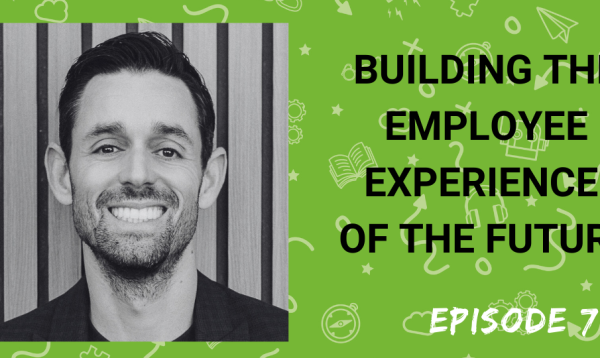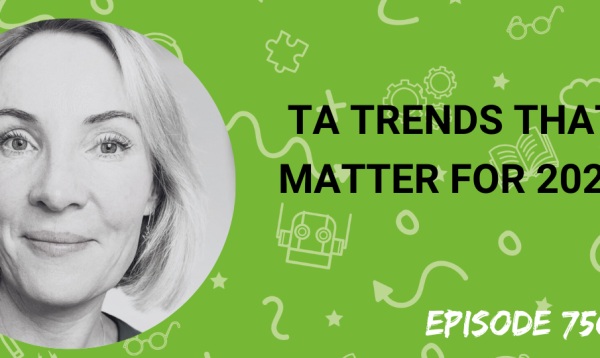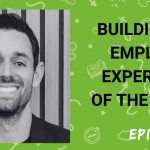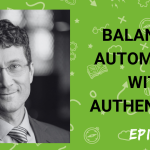In this episode Matt Alder talks to Melanie Hayes Head of Organisational Development at Compass
Over the last few years an increasing number of employers have been developing apprenticeship programmes to address long term skill shortages in their industries. One company who are doing this very successfully are Compass who have offered over 3000 Apprenticeships in the last five years and have achieved a Grade 2 Ofsted rating for their programme.
My guest for this episode is Melanie Hayes Head of Organisational development at Compass and it was very interesting to hear more about the programme and the value it brings to her organisation.
In the interview we discuss:
• Why Compass have an apprentice strategy
• The different types of value it brings to the business
• How apprentices are recruited
• Differing candidate expectations
• The number one reason why every employer should invest in apprenticeships
Mel also talks about the changing landscape in experience hire recruitment and shares her thoughts on the future
Subscribe to this podcast in iTunes
Transcript:
Matt Alder [00:00:00]:
Support for this podcast comes from Format. Format provide award winning careers websites to employers such as View, Atkins and Muller. Working with Format can help you attract and engage higher numbers of better quality applicants. They get these results by their complete focus on the candidate experience. Fantastic technology that enables long term passive candidate engagement and seamless integration with your ats. For more information and to get in.
Matt Alder [00:00:30]:
Touch for a free review of your.
Matt Alder [00:00:31]:
Career site, Please go to www. Format.com podcast. Format is spelt with a number 4, then M A T the web address again. Www. Format.com podcast.
Matt Alder [00:01:04]:
Hi everyone, this is Matt Alder. Welcome to episode 24 of the Recruiting Future podcast. Over the last few years, an increasing number of employers are developing apprentice schemes to address long term skill shortages in their industries. One company who are doing this very successfully are Compass. My guest this week is Melanie Hayes, Head of Organizational Development for Compass, who shares some insights on Compass is doing in this area. Hi everyone and welcome to another Recruiting Future podcast interview. My guest this week is Mel Hayes from Compass. Hi Mel, how are you?
Melanie Hayes [00:01:44]:
I’m good, thanks Matt.
Matt Alder [00:01:45]:
That’s cool. Could you sort of introduce yourself to everyone, tell us a little bit about your background and what you’re, what you’re doing for Compass?
Melanie Hayes [00:01:56]:
Yeah, absolutely. So I am currently the head of Organizational Development at Compass Group which covers resourcing, learning and development, talent, doing some work around diversity and then some other kind of bits that I think nobody else picks up. But exciting big company Compass is or employs 60,000 people in the UK. We are a FTSE 30 company and we’re also going through a massive period of growth. So it’s a really, really exciting time at the moment in the organisation and prior to that I started my career in retail, so I’ll just give a very brief overview. Started my career in retail and then I moved into recruitment. So made quite a tactical decision which I think is unusual. And I’ve held a couple of roles as heads of Resourcing, head of Resourcing and talent and each of those roles I’ve always gone into organizations to build resourcing teams or restructure resourcing teams so that they are delivering direct sourcing, improved quality etc.
Matt Alder [00:03:06]:
Cool.
Matt Alder [00:03:06]:
Okay, thanks for the, thanks for the overview. Now the. One of the. Well, it’s always a pleasure to talk to you, but one of the main reasons that I wanted to talk to you on this podcast was the work that Compass have been doing with apprentices. Could you tell us a little bit about, you know, your, your apprentice strateg and what you’ve been up to in that kind of area?
Melanie Hayes [00:03:32]:
Yeah, absolutely. So I think this is one of the things that I am probably most proud of when it comes to my team. The young people agenda as a whole is really, really important to Compass and we put a lot of effort in, even down to employing an early careers manager. And so his role within that is to cover things like work experience, how we are getting children or kids of school age to understand about careers within food services or fm. And following on from that, we do a huge amount of work around our apprenticeship program. So I was delighted to be a part of our graduation, our apprenticeship graduation this year where we graduated 542 apprentices. Yeah, yeah. So really exciting. And it covers a number of things. So we do anything from functional roles. We have a very specific chef academy which really enables young people to get good quality training within food service and not necessarily restaurants, but actually that could take them up to Michelin star quality. We had one of our apprentices this year who won the National Apprentice of the Year.
Matt Alder [00:04:49]:
Okay.
Melanie Hayes [00:04:50]:
And we are looking over the next few years to significantly increase the number of apprentices that we’re putting through the program on an annual basis. We also deliver our own qualifications so we draw down funding and do a lot of the work ourselves just because we think it’s really important that we get some of these things right.
Matt Alder [00:05:08]:
Yeah, I mean that was going to be my, that was going to be my next question. I mean, do, do all these people kind of go on to careers in the, in the company? Is that the sort of next step after the apprentice graduation?
Melanie Hayes [00:05:22]:
Yeah, well, that’s the plan. So when we bring them on board, we hope then to place them into roles within the organisation. Some of our apprentices that completed the Chef Academy have all gone into chef to party roles which is kind of will take them on their journey. And we’re doing some work around career pathing actually, which helps them to understand what the apprenticeship can give them in the longer term. So lots of opportunity. We’re going through a significant period of growth in the business and it’s really exciting. So actually that opens up even more opportunity for these young people.
Matt Alder [00:05:59]:
Fantastic. And what do you think the sort of value is to your business of putting so much effort into apprentices? Is it purely a kind of a future talent initiative or are there other things, other things that you think the business benefits from round doing This, I.
Melanie Hayes [00:06:18]:
Think there’s a significant part of it for us, covers future talent. We’re in an industry and I’ve worked in previous food service and FM organisations, so I kind of understand the challenges across the industry or the sector, should I say. And I don’t think schools do enough around vocational careers. So there’s lots of conversation around academic careers and not really enough around vocational. And so what this enables us to do is to help people to understand what it’s like to work in a contract catering environment. It helps them to understand what career progression. We are filling a pipeline, if we’re honest. You know, we have a growth plan that’s exciting but also a little bit scary from a recruitment perspective. And if I give you one example alone, there’s been some major contract wins in our business and we are looking for one contract alone in the next 12 months to recruit 220 chef managers and that’s just one contract win. So to start focusing on building a pipeline that supports a number of other channels, of course it’s really important. And actually not only that, we do a lot of work with the education sector. Chartwells is one of our biggest, one of our big sectors within the organisation. And to be able to work with some of those schools and colleges that are also our clients, it’s good for business as well. But I think predominantly we just are really focused on making sure that we’re giving support, whether that comes from work experience programmes, right the way through to our graduates.
Matt Alder [00:08:02]:
And how do you sort of find and select your apprentices? What sort of process or methodology or strategy do you use to get the right people on the program?
Melanie Hayes [00:08:16]:
So we use a couple of methods, we use some internal methods. So for example, when we’ve had people coming through work experience programmes with us, we offer them the opportunity to go for the apprenticeship programs. We have people that have joined us as part time employees that show an interest in wanting to progress their career and again they go through the selection process. And we also do some external advertising where we’re going out and we’re working with schools and colleges and actually we’re working with other third party providers. So we work with Springboard, we work with bitc, we do work with a number of other kind of third parties and we go to things like the Big Conversation, which just helps to raise awareness about what we do.
Matt Alder [00:09:04]:
And how do the kind of the candidate expectations differ from the, you know, the kind of experienced hire recruitment that you do. What differences are there in the main?
Melanie Hayes [00:09:18]:
I mean, our apprenticeship programs go 16 to 24 year olds. So. But in the main you’ve got people with very little work experience and so I think you have to do much more of a sell on the business and an opportunity. I do think apprentices are really interesting because location can cause issues. So actually we have a number of apprenticeship opportunities in central London and central London always appears to be much harder to recruit for.
Matt Alder [00:09:51]:
Okay. And imagine that’s to do with travel and all those kind of things. Is it?
Melanie Hayes [00:09:58]:
Yeah, yeah. I think that adds to it. And we’re not, so we’re not an organization that pays the apprenticeship rates. So apprenticeship rates are quite low and I know they’re intending to put those up and actually we don’t, we pay more.
Matt Alder [00:10:10]:
Okay.
Melanie Hayes [00:10:11]:
So, you know, we hope that that makes it a much more appealing package, so to speak.
Matt Alder [00:10:17]:
So you kind of mentioned the, you know, apprentices in the catering services sector, which is obviously where you guys are working. I mean, more broadly, do you think every company should have an apprentice strategy or is it only appropriate in certain sectors?
Melanie Hayes [00:10:33]:
No, I think everybody should look to do it. I think it’s important. You go to lots of events and you hear lots of people talking about skill shortages and I just think it’s really important that we all then commit to the future. And I know this requires investment for a lot of companies, but if we’re not helping to support a pipeline, then the skill shortages are just going to get it. Well, it’s going to get harder.
Matt Alder [00:10:57]:
Yeah, yeah, yeah, absolutely. And what, what advice would you give to a company sort of looking at their strategy here or looking at doing this for the, for the first time?
Melanie Hayes [00:11:08]:
I would always go with a case study example. So I would always just think about an area where, where you can add some value, where actually the individual gets the opportunity to see the job properly, but you can give that person time. So you need to give your apprentice time.
Matt Alder [00:11:26]:
Okay.
Melanie Hayes [00:11:27]:
Which, which I don’t think everybody understands fully. So, you know, so I think you need to give that commitment to people.
Matt Alder [00:11:34]:
Okay, thank you. And sort of stepping, stepping out into kind of the wider, you know, recruitment, recruitment market. How are you, you know, what’s it looking like at the moment? How are you finding it? Is it, is it easier to recruit at the moment? Is it harder to recruit at the moment? What’s, you know, what’s so changed over the last 18 months or so?
Melanie Hayes [00:11:55]:
I think it’s getting harder. I think salaries appear to be going up. So I think there’s more negotiation when we get to offer. We’ve had more people counter offered than I think I’ve seen in a few years.
Matt Alder [00:12:07]:
Okay.
Melanie Hayes [00:12:08]:
I think on the flip side of that though, we’re starting to see more movement. So that generates a better quality of candidate. I’m not sure that’s the right way to put it, actually. I just think. More choice, should I say?
Matt Alder [00:12:21]:
Yeah. And are you sort of noticing any, any changes in candidate expectations or behavior or where you’re finding them? Is that changing as well?
Melanie Hayes [00:12:31]:
I think in some. Not. Not in all actually. But in some cases our candidates are becoming much more demanding.
Matt Alder [00:12:36]:
Okay.
Melanie Hayes [00:12:37]:
And interestingly, we’ve worked on a few senior roles recently and some mid level roles whereby I think historically, if you’ve given several options in interview dates, people have tried to make it work. I think there’s so much opportunity going on for people and people are out with other companies that getting candidates into process sometimes is harder.
Matt Alder [00:13:03]:
Yeah. Okay.
Melanie Hayes [00:13:04]:
And it used to be getting hiring managers into process was harder.
Matt Alder [00:13:07]:
Okay. So it’s kind of sort of a complete flip from two or three years ago.
Melanie Hayes [00:13:12]:
Cool.
Matt Alder [00:13:12]:
Okay. That’s interesting. And what’s next for Compass? What’s on your radar at the moment? What are you looking at over the next 12 to 18 months?
Melanie Hayes [00:13:26]:
So it’s really exciting for us. I joined the company in January and we’ve gone through a restructure, so we’ve reorged our resourcing function to support the business. We’ve had five years of kind of no growth and this year massive growth. So the structure that we’ve put in place is there to help support the growth. And actually we’ve created a scalable model which is exciting. So we’ve spent the last seven months looking at process and kind of getting back to basics. And next year I think for us is some real focus on how we’re taking it out to market. So what’s, what’s our brand? We have so many different businesses within the Compass family. How are we going out and promoting those? And I’m also focusing on how we’re educating our recruiters. Matt, you’ll know this because I think I’ve talked about this quite a lot, but I have a real passion for us actually doing something with recruiters to help them develop. And I don’t think there’s enough out there.
Matt Alder [00:14:25]:
Okay.
Melanie Hayes [00:14:25]:
So I’m using a couple of products at the moment and we’re testing a few things out, but that’s with a view to making our recruiters better at sourcing.
Matt Alder [00:14:33]:
Cool. Fantastic. I mean, I suppose that kind of leads on quite nicely to my final question, which is about trends and tools and technologies and what’s kind of happening in the industry. What are you sort of looking at at the moment? What trends do you think are interesting? What tools and technologies do you think might develop as we sort of go through the rest of this year and.
Melanie Hayes [00:14:59]:
Next so at campus, because we’ve been doing a lot of work around putting the basics in and getting the basics right, I think we’re just starting to focus on different technologies. I think the ATS that we’ve got is good and it works well, but we’re thinking about what we’re linking in with that. So for me it’s around in some roles. We’ve got a huge volume of applicants, so we’re looking at ways that we can help the resourcing process to auto screen through various kind of tests, online tests that are kind of linked through. We’re looking at video interview at the moment. So we’re just about to do a trial with a number of roles that cover some of our volume and and then just some other tools that are really there about to help the recruiters with sourcing, which I think I’ve already mentioned.
Matt Alder [00:15:48]:
So cool. It sounds like a very exciting time. Mel, thanks very much for talking to me.
Melanie Hayes [00:15:54]:
Lovely. Thanks, Matt.
Matt Alder [00:15:55]:
My thanks to Mel Hayes. For show notes and past episodes of the podcast, please go to www.rfpodcast.com. you can also subscribe to the mailing list there and find out more about me on the Work with Matt Alder page. You can, of course, subscribe to the podcast itself on itunes and on Stitcher. Thanks very much for listening. I’ll be back next week and I hope you’ll join me.








